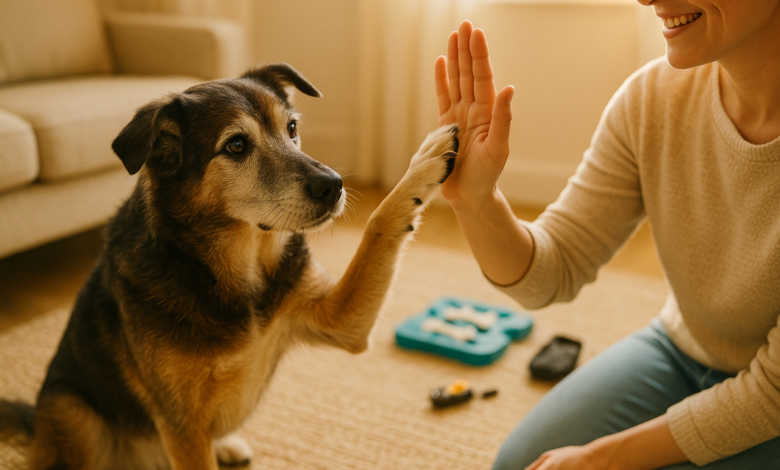Myth Busted: Can You Teach an Old Dog New Tricks?

For centuries, people have repeated one of the world’s most stubborn myths: “You can’t teach an old dog new tricks.”
The phrase first appeared in John Fitzherbert’s 1534 treatise The Boke of Husbandry, in which he advised that “the dogge must lerne it, whan he is a whelpe… for it is harde to make an olde dogge to stoupe.” More than a decade later, English writer John Heywood helped popularise the saying, and it’s lingered in everyday speech ever since.
But modern trainers and scientists say it’s time we finally retire the phrase. From laboratories to living rooms, research now shows that dogs never stop learning — no matter how many candles are on their birthday cake.
What the Science Really Says
At the University of Vienna, researchers at the Messerli Research Institute tested 95 Border Collies aged between five months and 13 years using touchscreen tasks designed to measure learning, reasoning, and memory.
Lead scientist Lisa Wallis and her colleague Friederike Range discovered that while older dogs took longer to master the new tasks — a sign of slower learning speed — their long-term memory remained strikingly intact.
“Older dogs required more trials than younger ones before they were able to solve the task correctly,” Wallis explained. “As in people, older dogs find it more difficult to change old habits or what they have learned.” Yet when researchers repeated the experiment six months later, almost all of the dogs — young and old alike — remembered the correct images.
It’s a finding echoed by VCA Animal Hospitals, which confirms that age does little to diminish a dog’s capacity for learning. “Dogs are innately good learners… if a dog is awake, he is learning,” their experts write, adding that “adult dogs are often easier to train than their younger canine friends because they can focus for longer periods of time.”
In fact, research published in Frontiers in Veterinary Science shows that keeping older dogs mentally active with new challenges can even help slow cognitive decline — the canine equivalent of age-related forgetfulness in humans.
Why Mature Dogs Often Make Better Students
Puppies may have boundless energy, but their attention spans are short. Older dogs, on the other hand, are calmer, more focused, and far more in tune with their humans.
Trainer and AKC GoodDog! Helpline manager Penny Leigh, CPDT-KA says it best: “It is definitely not true that you can’t teach an old dog new tricks.” She explains that “dogs who feel useful and that they have a ‘job’ tend to keep a youthful outlook, much like humans who stay engaged after retirement.”
And because mature dogs already understand household routines and human tone of voice, training them is often about refinement, not reinvention.
The Tricks That Work Best
Experts say the key is to keep it gentle, engaging, and kind on the joints. VCA Animal Hospitals suggests simple, rewarding tricks such as “speak,” “high five,” “shake,” or even retrieving slippers and putting toys away.
For dogs coping with sensory loss, trainers recommend adapting to their strengths: use hand signals or stay in their line of sight if hearing has faded; rely on clear verbal cues if vision has dimmed.
And, as Penny Leigh advises, keep sessions short and upbeat: “Teach everything in very short steps and work up to the finished product. If your dog shows signs of fatigue, stop and try again later.”
Why Training Matters at Any Age
Beyond obedience, regular learning keeps a senior dog’s brain sharp and spirits high. VCA Animal Hospitals notes that training stimulates curiosity and confidence, while Grey Muzzle adds: “Dogs of all ages need mental stimulation to feel their best… age-appropriate activities such as puzzle toys, scent games, and gentle tricks help senior dogs thrive.”
The American Kennel Club agrees, pointing to low-impact sports like Trick Dog, Rally, and Scent Work as ideal for older canines — easy on the body, big on enrichment, and perfectly suited to a living room floor.
The Las Vegas Connection
Here in Las Vegas, local rescue groups know that training can make the difference between a senior dog being passed over or finding their forever home. The Animal Foundation’s “Bark to Basics” program welcomes dogs of all ages, teaching essential manners and confidence skills.
The organisation also promotes senior adoptions year-round, offering discounted fees for adopters aged 60+ who welcome dogs three years and older. Every grey muzzle that sits politely for a treat proves the point: age has nothing to do with intelligence — only opportunity.
The Bottom Line
So, can you teach an old dog new tricks? Science, experience, and thousands of wagging tails all say yes.
While senior dogs may take a little longer to learn, the Vienna team found they can form and retain new associations just as well as their younger counterparts.
As the Humane Society of Missouri reminds us: “It’s never too late to adjust a dog’s behaviour. Dogs live in the moment — they don’t dwell on the past or worry about the future.”
With patience, consistency, and love, older dogs can master new behaviours and enjoy the mental stimulation that keeps them youthful and connected. Forget the proverb — the only real limit on what a dog can learn is the kindness of the person holding the leash.
Have a myth you’d like us to investigate next week? Email the Dog Friendly Las Vegas Myth Busting Monday team with your ideas at roadie@dogfriendlylasvegas.com — we might feature it in our next edition!
